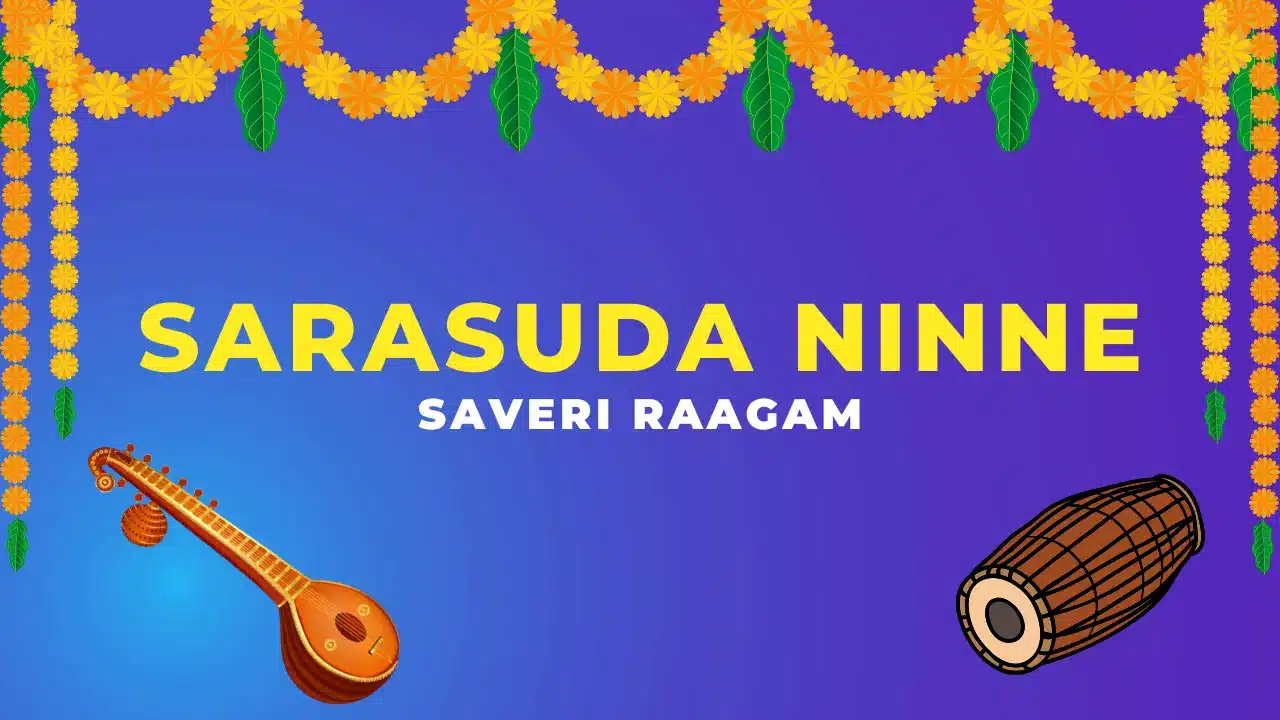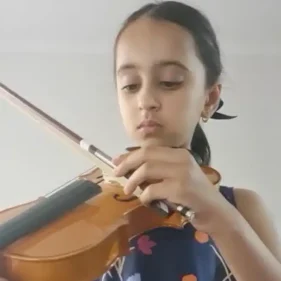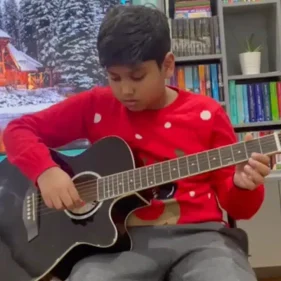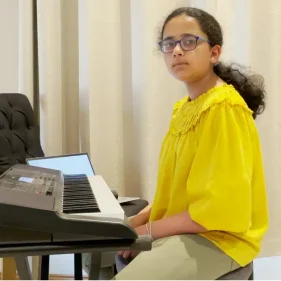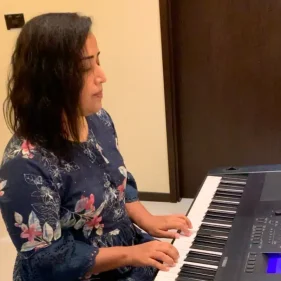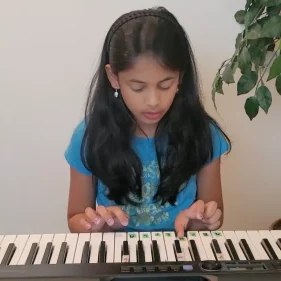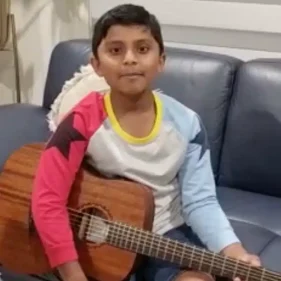Introduction
Saveri is a raagam conveys the emotion (Rasa), Karuna, which is compassion. The raagam is belongs to the category Heavy Raagam, in the Carnatic Circle. This Blog has details about the Sarasuda Ninne Varnam and its Raagam

The Music that I have learnt is like worshipping God. It’s absolutely like a prayer. – Ravi Shankar
Saveri arises from the Mayamalavagowla Cluster. The basic lessons of the Carnatic Music are in Raagam Mayamalavagowla. The students may find a similarity between Mayamalavagowlai and Saveri. In Carnatic training these are the lessons that form the basic.
Although they sound similar, the similarity stops there. Saveri starts differing from Mayamalavagowlai in the Aarohanam, where it takes only 5 swaras in an ascending order. Mayamalavagowlai takes all the swaras. The avarohanam of Saveri has all the seven swaras, descending linearly. Ga and Ni are absent in the Aarohanam, and that is where the difference lies. The Aarohanam and Avarohanam goes like this.
Aro: Sa Ri Ma Pa Da Ṡa
Ava: Sa Ni Da Pa Ma Ga Ri Ṡa
Sarasuda Ninnekori
Saveri Raagam is a Raagam is sung with extensive renditions at concerts. From the sea of compositions in this Raagam, Sarasuda Ninnekori is a famous one. Many musicians elaborate the swaras when they are performing this Varnam in the concert. This Varnam is by Kotavasal Venkatarama Iyer. He has spent most of his work life, composing Taana Varnams. Taana Varnams are Varnams explaining the characteristics of a Raagam in an elaborate way. These Varnams often find a place in the beginning of a concert.

Did You Know?
Carnatic music has a rich tradition of passing down knowledge from teacher to student through the guru-shishya parampara. This traditional method of learning ensures the preservation of the art form and allows for a deep mentor-student relationship.
Sarasuda Ninnekori has a special place in the hearts of the Musicians as the musician performing this Varnam, will use the tone of the Varnam to give an invigorating start to the concert. They sing the Varnam with the usual preset notes and swara patterns. They will also go on to improvise on the swara patterns. This will make the audience curious as to what the musician has to offer them.
Meaning of Sarasuda Ninnekori
This Varnam is set to the tone of addressing Lord Venkateshwara, residing on the hills. The Varnam calls upon the lord, pointing out to a girl who is mesmerised with him. The girl is being tormented by the longing for him. The verses goes on to tell the Lord that he has to pay attention to this woman, even if he is living on the pinnacle of hills. The Varnam ends with a call for affection to be showered on the woman that very instant.
Raga: Saveri
Tala: Aadi
Composer: Kotthavasal Venkatrama Iyer
Ava: S N3 D1 P M1 G3 R1 Ṡ
Aro: S R1 M1 P D1 Ṡ
Pallavi
| S | , | R | , | G | , | R | G | R | , | , | , | R | G | R | R | | | |||
| Sa | – | ra | – | su | – | – | – | da | – | – | – | ni | – | – | – | | | |||
| Sa | ,- | S | R | S | Ṇ | Ḍ | , | | | G | R | R | G | R | S | Ṇ | Ḍ | || | ||
| – | – | nne | – | – | – | – | – | | | ko | – | – | – | ri | – | – | – | || | ||
| S | R | P | M | G | R | S | D | D | M | G | R | S | Ḍ | S | R | | | |||
| cha | – | – | – | la | – | – | ma | – | – | ru | – | – | lu | – | – | | | |||
| M | P | D | Ṙ | Ṡ | ,- | M | P | | | D | N | D | M | G | R | S | Ḍ | || | ||
| – | – | – | ko | – | – | nna | – | | | – | – | – | – | di | – | ra | – | || |
Anupallavi
| D | D | P | M | P | D | R | M | P | D | M | , | G | R | S | R | | | |||
| Gi | – | – | ri | – | – | ni | – | – | – | ve | – | la | – | yu | – | | | |||
| Ṙ | Ṡ | N | D | N | D | P | D | | | P | M | P | D | Ṡ | , | , | , | || | ||
| Shri | – | – | ven | – | – | ka | – | | | te | – | – | – | sha | – | – | – | || | ||
| P | D | Ṡ | Ṙ | Ġ | Ṙ | Ṙ | , | Ġ | Ṙ | Ṙ | Ġ | Ṙ | Ṡ | N | D | | | |||
| ka | – | – | – | ru | – | – | – | ni | – | – | n | cha | – | – | – | | | |||
| Ṙ | Ṡ | ,- | N | D | P | D | M | | | ,- | G | R | S | S | , | Ṇ | Ḍ | || | ||
| i | de | – | – | – | – | sa | – | | | – | ma | – | – | ya | – | mu | – | || |
Muktayi Swaram
| S | , | R | G | R | S | R | , | S | G | R | S | Ṇ | Ḍ | P̣ | Ḍ | | | |||
| R | , | S | G | R | G | S | R | | | Ḍ | S | R | M | P | , | ,- | D | || | ||
| D | P | M- | R | , | M | P | D | S | R | S | P | M | D | P | N | | | |||
| D | N | P | D | M | P | S | R | | | M | P | D | N | D | , | , | , | || |
| N | D | P | M | , | P- | Ṡ | N | D | P | , | D | Ṙ | Ṡ | N | D | | | |||
| P | , | M | D | , | P- | N | D | | | P | D | Ṡ | Ṙ | Ġ | Ṙ | Ṙ | , | || | ||
| D | Ġ | Ṙ | Ṡ | N | D | D | Ṡ | N | D | P | M | G | R | , | S | | | |||
| Ġ | Ṙ | , | Ṡ | N | D | Ṙ | Ṡ | | | N | D | P | M | G | R | S | Ḍ | || | ||
| (Sa) |
Charanam
| D | , | ,- | M | P | D | Ṡ | , | N | D | P | M | G | R | S | Ḍ | | | |||
| Da | – | ni | – | – | – | pai | – | – | – | – | – | ne | – | na | – | || | |||
| R | , | ,- | R | S | R | M | P | | | ,- | D | P | N | D | P | M | P | | | ||
| ru | – | – | na | – | – | ee | – | | | – | ve | – | – | la | – | – | – | || |
Chittai Swaras 1
| D | , | ,- | P | , | ,- | D | , | P | , | M | , | G | , | R | , | | | |||
| M | , | ,- | P | , | ,- | D | , | | | , | ,- | N, | D | ,- | P | , | M | || |
Chittai Swaras 2
| D | , | N | P | D | P | M | P | D | N | D | M | G | R | S | Ḍ | | | |||
| S | , | R | M | P | D | S | R | | | M | P | ,- | M | N | D | P | M | || |
Chittai Swaras 3
| D | N | D | M | G | R | N | D | M | G | R | S | D | M | G | R | | | |||
| S | G | R | S | Ṇ | Ḍ | R | S | | | Ṇ | Ḍ | P̣ | Ḍ | S | R | M | P | || | ||
| D | M | P | D | Ṡ | N | D | Ṙ | Ṡ | N | D | P | D | Ṡ | Ṙ | Ġ | | | |||
| D | Ṡ | Ṙ | P | D | Ṡ | M | P | | | D | Ġ | Ṙ | Ṡ | N | D | P | M | || |
Chittai Swaras 4
| Ṡ | , | , | , | , | ,- | Ṙ | Ṡ | N | D | P | M | G | R | S | Ḍ | | | |||
| S | , | , | , | , | ,- | P | M | | | D | P | N | D | P | M | P | Ḍ | || | ||
| Ṡ | N | D | P | , | D | N | D | P | M | , | P | D | M | G | R | | | |||
| N | D | P | M | Ṡ | N | D | P | | | Ṙ | Ṡ | N | D | ,- | P | , | Ḍ | || | ||
| M | G | R | S | , | ,- | Ḍ | S | Ṙ | M | , | P | R | M | P | Ḍ | | | |||
| P | M | P | D | Ṡ | M | P | D | | | Ṡ | Ṙ | Ġ | Ṙ | Ṙ | Ṡ | N | Ḍ | || | ||
| Ṙ | Ġ | Ṙ | Ṡ | N | D | P | , | | | M | G | R | S | ,- | R | M | P | || |
| Ṡ | , | , | , | , | ,- | Ṙ | Ṡ | N | D | P | M | G | R | S | Ḍ | | | |||
| S | , | , | , | , | ,- | P | M | | | D | P | N | D | P | M | P | Ḍ | || | ||
| Ṡ | N | D | P | , | D | N | D | P | M | , | P | D | M | G | R | | | |||
| N | D | P | M | Ṡ | N | D | P | | | Ṙ | Ṡ | N | D | ,- | P | , | Ḍ | || | ||
| M | G | R | S | , | ,- | Ḍ | S | Ṙ | M | , | P | R | M | P | Ḍ | | | |||
| P | M | P | D | Ṡ | M | P | D | | | Ṡ | Ṙ | Ġ | Ṙ | Ṙ | Ṡ | N | Ḍ | || | ||
| Ṙ | Ġ | Ṙ | Ṡ | N | D | P | , | | | M | G | R | S | ,- | R | M | P | || |
Vanajakshiro – is also a famous varnam, sung in many concerts and its set to the raagam Kalyani, composed by Patnam Subramaniya Iyer
FAQs
Write about Sarasuda Ninne Varnam?
Sarasuda Ninne Varnam is a Varnam set to address Lord Venkateswara residing upon the hills, calling him to pay attention to a woman, who is pining for him.
Who is the composer of Sarasuda Ninne Varnam?
The composer of Sarasuda Ninne Varnam is Kotavasal Venkatarama Iyer.
In what Raagam is the Varnam Sarasuda Ninne composed?
Sarasuda Ninne is composed in the Raagam Saveri.
Where can I find the notes and the notations of Sarasuda Ninne Varnam?
The notes and notations of the varnam are given in the blog above.
Mention a few popular recordings of Sarasuda Ninne Varnam?
A few popular recordings of Sarasuda Ninne varnam are by the following musicians. Dr. Sowmya, Shri. Phalgat Ramprasad and Spoorthi Rao
Related Blog: Raagam Thalam Sruthi

